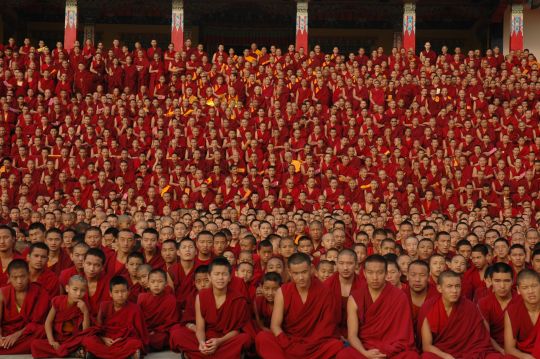- Home
- FPMT Homepage
Foundation for the Preservation of the Mahayana Tradition
The FPMT is an organization devoted to preserving and spreading Mahayana Buddhism worldwide by creating opportunities to listen, reflect, meditate, practice and actualize the unmistaken teachings of the Buddha and based on that experience spreading the Dharma to sentient beings. We provide integrated education through which people’s minds and hearts can be transformed into their highest potential for the benefit of others, inspired by an attitude of universal responsibility and service. We are committed to creating harmonious environments and helping all beings develop their full potential of infinite wisdom and compassion. Our organization is based on the Buddhist tradition of Lama Tsongkhapa of Tibet as taught to us by our founders Lama Thubten Yeshe and Lama Thubten Zopa Rinpoche.
- Willkommen
Die Stiftung zur Erhaltung der Mahayana Tradition (FPMT) ist eine Organisation, die sich weltweit für die Erhaltung und Verbreitung des Mahayana-Buddhismus einsetzt, indem sie Möglichkeiten schafft, den makellosen Lehren des Buddha zuzuhören, über sie zur reflektieren und zu meditieren und auf der Grundlage dieser Erfahrung das Dharma unter den Lebewesen zu verbreiten.
Wir bieten integrierte Schulungswege an, durch denen der Geist und das Herz der Menschen in ihr höchstes Potential verwandelt werden zum Wohl der anderen – inspiriert durch eine Haltung der universellen Verantwortung und dem Wunsch zu dienen. Wir haben uns verpflichtet, harmonische Umgebungen zu schaffen und allen Wesen zu helfen, ihr volles Potenzial unendlicher Weisheit und grenzenlosen Mitgefühls zu verwirklichen.
Unsere Organisation basiert auf der buddhistischen Tradition von Lama Tsongkhapa von Tibet, so wie sie uns von unseren Gründern Lama Thubten Yeshe und Lama Thubten Zopa Rinpoche gelehrt wird.
- Bienvenidos
La Fundación para la preservación de la tradición Mahayana (FPMT) es una organización que se dedica a preservar y difundir el budismo Mahayana en todo el mundo, creando oportunidades para escuchar, reflexionar, meditar, practicar y actualizar las enseñanzas inconfundibles de Buda y en base a esa experiencia difundir el Dharma a los seres.
Proporcionamos una educación integrada a través de la cual las mentes y los corazones de las personas se pueden transformar en su mayor potencial para el beneficio de los demás, inspirados por una actitud de responsabilidad y servicio universales. Estamos comprometidos a crear ambientes armoniosos y ayudar a todos los seres a desarrollar todo su potencial de infinita sabiduría y compasión.
Nuestra organización se basa en la tradición budista de Lama Tsongkhapa del Tíbet como nos lo enseñaron nuestros fundadores Lama Thubten Yeshe y Lama Zopa Rinpoche.
A continuación puede ver una lista de los centros y sus páginas web en su lengua preferida.
- Bienvenue
L’organisation de la FPMT a pour vocation la préservation et la diffusion du bouddhisme du mahayana dans le monde entier. Elle offre l’opportunité d’écouter, de réfléchir, de méditer, de pratiquer et de réaliser les enseignements excellents du Bouddha, pour ensuite transmettre le Dharma à tous les êtres. Nous proposons une formation intégrée grâce à laquelle le cœur et l’esprit de chacun peuvent accomplir leur potentiel le plus élevé pour le bien d’autrui, inspirés par le sens du service et une responsabilité universelle. Nous nous engageons à créer un environnement harmonieux et à aider tous les êtres à épanouir leur potentiel illimité de compassion et de sagesse. Notre organisation s’appuie sur la tradition guéloukpa de Lama Tsongkhapa du Tibet, telle qu’elle a été enseignée par nos fondateurs Lama Thoubtèn Yéshé et Lama Zopa Rinpoché.
Visitez le site de notre Editions Mahayana pour les traductions, conseils et nouvelles du Bureau international en français.
Voici une liste de centres et de leurs sites dans votre langue préférée
- Benvenuto
L’FPMT è un organizzazione il cui scopo è preservare e diffondere il Buddhismo Mahayana nel mondo, creando occasioni di ascolto, riflessione, meditazione e pratica dei perfetti insegnamenti del Buddha, al fine di attualizzare e diffondere il Dharma fra tutti gli esseri senzienti.
Offriamo un’educazione integrata, che può trasformare la mente e i cuori delle persone nel loro massimo potenziale, per il beneficio di tutti gli esseri, ispirati da un’attitudine di responsabilità universale e di servizio.
Il nostro obiettivo è quello di creare contesti armoniosi e aiutare tutti gli esseri a sviluppare in modo completo le proprie potenzialità di infinita saggezza e compassione.
La nostra organizzazione si basa sulla tradizione buddhista di Lama Tsongkhapa del Tibet, così come ci è stata insegnata dai nostri fondatori Lama Thubten Yeshe e Lama Zopa Rinpoche.
Di seguito potete trovare un elenco dei centri e dei loro siti nella lingua da voi prescelta.
- 欢迎 / 歡迎
简体中文
“护持大乘法脉基金会”( 英文简称:FPMT。全名:Foundation for the Preservation of the Mahayana Tradition) 是一个致力于护持和弘扬大乘佛法的国际佛教组织。我们提供听闻,思维,禅修,修行和实证佛陀无误教法的机会,以便让一切众生都能够享受佛法的指引和滋润。
我们全力创造和谐融洽的环境, 为人们提供解行并重的完整佛法教育,以便启发内在的环宇悲心及责任心,并开发内心所蕴藏的巨大潜能 — 无限的智慧与悲心 — 以便利益和服务一切有情。
FPMT的创办人是图腾耶喜喇嘛和喇嘛梭巴仁波切。我们所修习的是由两位上师所教导的,西藏喀巴大师的佛法传承。
繁體中文
護持大乘法脈基金會”( 英文簡稱:FPMT。全名:Found
ation for the Preservation of the Mahayana Tradition ) 是一個致力於護持和弘揚大乘佛法的國際佛教組織。我們提供聽聞, 思維,禪修,修行和實證佛陀無誤教法的機會,以便讓一切眾生都能 夠享受佛法的指引和滋潤。 我們全力創造和諧融洽的環境,
為人們提供解行並重的完整佛法教育,以便啟發內在的環宇悲心及責 任心,並開發內心所蘊藏的巨大潛能 — 無限的智慧與悲心 – – 以便利益和服務一切有情。 FPMT的創辦人是圖騰耶喜喇嘛和喇嘛梭巴仁波切。
我們所修習的是由兩位上師所教導的,西藏喀巴大師的佛法傳承。 察看道场信息:
- FPMT Homepage
- News/Media
-
- Study & Practice
-
-
- About FPMT Education Services
- Latest News
- Programs
- New to Buddhism?
- Buddhist Mind Science: Activating Your Potential
- Heart Advice for Death and Dying
- Discovering Buddhism
- Living in the Path
- Exploring Buddhism
- FPMT Basic Program
- FPMT Masters Program
- FPMT In-Depth Meditation Training
- Maitripa College
- Lotsawa Rinchen Zangpo Translator Program
- Universal Education for Compassion & Wisdom
- Online Learning Center
-
- Prayers & Practice Materials
- Overview of Prayers & Practices
- Full Catalogue of Prayers & Practice Materials
- Explore Popular Topics
- Benefiting Animals
- Chenrezig Resources
- Death & Dying Resources
- Lama Chopa (Guru Puja)
- Lama Zopa Rinpoche: Compendium of Precious Instructions
- Lama Zopa Rinpoche: Life Practice Advice
- Lama Zopa Rinpoche Practice Series
- Lamrim Resources
- Mantras
- Prayer Book Updates
- Purification Practices
- Sutras
- Thought Transformation (Lojong)
- Audio Materials
- Dharma Dates - Tibetan Calendar
- Translation Services
- Publishing Services
- Ways to Offer Support
- Prayers & Practice Materials
-
- Teachings and Advice
- Find Teachings and Advice
- Lama Zopa Rinpoche Advice Page
- Lama Zopa Rinpoche: Compendium of Precious Instructions
- Lama Zopa Rinpoche Video Teachings
- ༧སྐྱབས་རྗེ་བཟོད་པ་རིན་པོ་ཆེ་མཆོག་ནས་སྩལ་བའི་བཀའ་སློབ་བརྙན་འཕྲིན།
- Podcasts
- Lama Yeshe Wisdom Archive
- Buddhism FAQ
- Dharma for Young People
- Resources on Holy Objects
- Teachings and Advice
-
-
*If a menu item has a submenu clicking once will expand the menu clicking twice will open the page.
-
-
- Centers
-
- Teachers
-
- Projects
-
-
-
-
*If a menu item has a submenu clicking once will expand the menu clicking twice will open the page.
-
-
- FPMT
-
-
-
-
-
The reason we are unhappy is because we have extreme craving for sense objects – samsaric objects – and we grasp at them. We are seeking to solve our problems, but we are not seeking in the right place. The right place is our ego-grasping.
Lama Thubten Yeshe
-
-
-
- Shop
-
-
-
The Foundation Store is FPMT’s online shop and features a vast selection of Buddhist study and practice materials written or recommended by our lineage gurus. These items include homestudy programs, prayers and practices in PDF or eBook format, materials for children, and other resources to support practitioners.
Items displayed in the shop are made available for Dharma practice and educational purposes, and never for the purpose of profiting from their sale. Please read FPMT Foundation Store Policy Regarding Dharma Items for more information.
-
-
Ordained Sangha
18
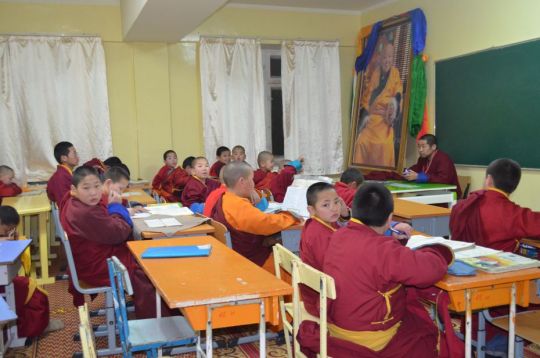
57 monks are offered lunch daily at Idgaa Choizinling through the Supporting Ordained Sangha Fund.
The Supporting Ordained Sangha Fund offers sponsorship for daily lunch for the 57 monks studying at Idgaa Choizinling Dratsang in Mongolia. Recently US$9,000 was offered to cover all of 2017.
Idgaa Choizinling was established in 2003 through FPMT Mongolia due to the kindness of many benefactors. Idgaa is strongly connected to Sera Je Monastery in India and serves as a focal point of Buddhist learning in Mongolia. Since its inception, FPMT has been offering food to the monks studying there.
In a letter to Lama Zopa Rinpoche, the monks expressed their gratitude, “Your very generous support of meals provides a most important condition for us to be well nourished, to be free to engage in practices, to listen to our Dharma teachers, and to contemplate and meditate on the Dharma.”
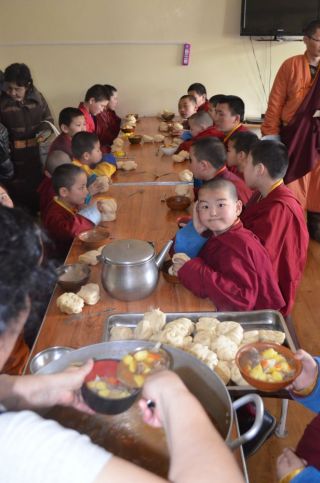
Young monks at Idgaa Choizinling enjoying daily lunch together.
“If you offer with the recognition that they are the guru’s pores,” Lama Zopa Rinpoche said in 2011 in reference to the Sera Je Food Fund which offers three vegetarian meals every day to the monks of Sera Je Monastery, “then that is an unbelievable way to collect merit. When you offer to many Sangha who have the same guru, then you are making offerings to that many pores of the guru. This is the easiest way to collect skies of merit by offering. By offering even just one candy or flowers or even one grain of rice to a statue of Buddha or even a visualized Buddha, you collect skies of merit. It is much more powerful than offering to the Three Jewels (Buddha, Dharma, Sangha) as well as all the statues, stupas and scriptures existing in all directions, so there is no question if really offering to the same guru’s disciple. These benefits should be understood so that when you make offerings to the guru’s pores that you think correctly. This is the best business.”
The Supporting Ordained Sangha Fund supports ordained monks and nuns as well as monasteries and nunneries by providing sponsorship for food, accommodations, educational needs, and health care for Sangha.
Please rejoice in this offering of daily food to these earnest monks who study and practice so sincerely to keep Buddhism alive in Mongolia.
You can learn more about the Supporting Ordained Sangha Fund and the ways it supports monasteries and nunneries.
6
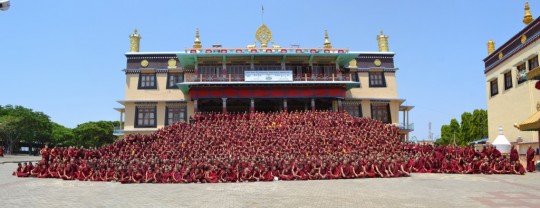
The monks of Sera Je Monastery are offered three nutritious meals every single day through the Sera Je Food Fund.
The Sera Je Food Fund (a project of the Supporting Ordained Sangha Fund) has been in operation for twenty-five years, offering free meals to the sincere monks of Sera Je Monastery daily.
In a typical month, nearly 22,000 bananas, 120 bottles of soy sauce, and an incredible 5,500 pounds of flour, among many other ingredients including vegetables, rice, noodles, and tea, are utilized in preparation for this offering of vegetarian meals for, on average, 1,600 monks every day.
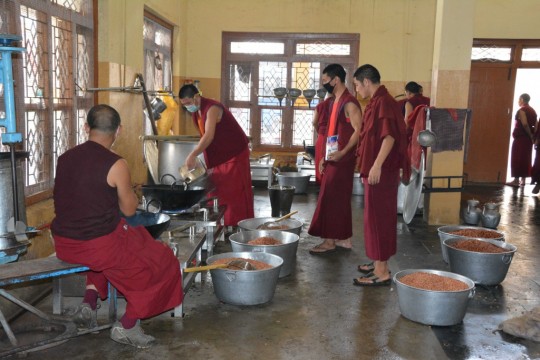
Approximately 50 monks help prepare meals for in the Sera Je Food Fund kitchen.
The Sera Je Food Fund doesn’t just supply food. A tremendous amount of work must go into the planning, cooking, serving, and cleaning up of the daily meals.
Every day each khangtsen (monastic house made up of monks from the same regions) informs the Sera Je Food Fund Kitchen how many monks will be joining for meals so the cooks can always prepare the right amount of food. There is almost no waste from the kitchen because any leftovers are offered to monks who engage in evening debate or classes allowing the monks to enjoy a second dinner if they are studying or debating late. Any food bought by the kitchen that is not used is sold back to the market making the waste for the kitchen extremely low. This is quite impressive when considering the volume of food being prepared and cooked.
Typically, about 50 monks are assigned to kitchen duties every day. They help ensure that the ingredients are top quality, that the kitchen is always hygienic and efficient, and that the food is tasty for the monks. Lunch is often eaten as a group in the Sera Je gompa when there are pujas or practices happening.
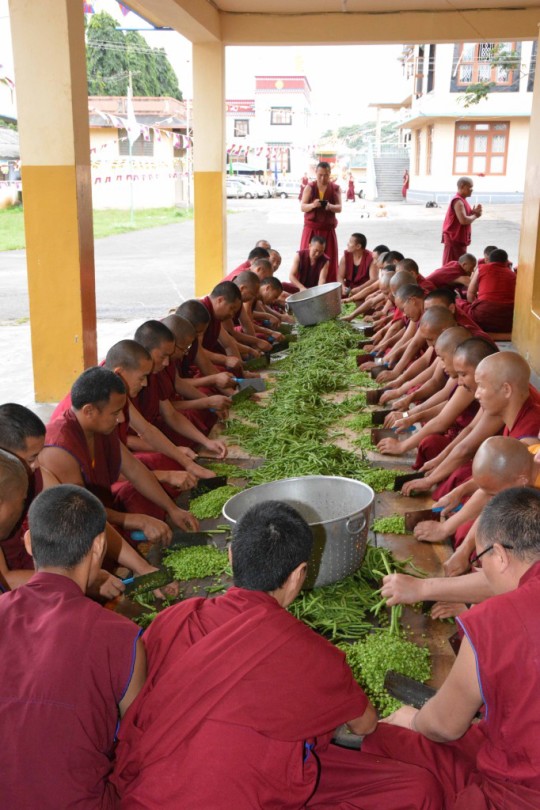
It takes a tremendous amount of food, supplies, equipment, and collective work to offer meals every day to the monks of Sera Je Monastery.
Equipment and kitchen supply needs are ongoing, maintenance and repairs are frequent, office supplies are needed for administration and accounting, pujas and prayers for the project’s success are regularly sponsored, and dry food is organized during special occasions such as holidays and major teaching events when the monastery kitchen is closed down. All of this costs approximately US$200,000 every year to actualize. A small price considering the incredible benefit offered to so many. Lama Zopa Rinpoche has taught extensively on the benefits of offering to Sangha.
The Supporting Ordained Sangha Fund was established to support monks and nuns with a focus on the health and sustainability of monasteries and nunneries. While the Sera Je Food Fund has been our most successful and ambitious project to date, future plans for this fund will enable FPMT to make ongoing offerings in a much broader way.
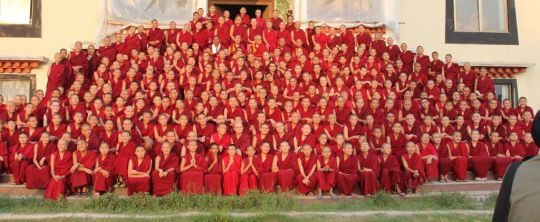
Lama Zopa Rinpoche with the nuns of Kopan Nunnery.
“Educating monks and nuns is one of the most important things in the world.” – Lama Zopa Rinpoche
The Sera Je Food Fund was established with very clear goals and recently one of those major objectives has been achieved. We look forward to releasing details on this in weeks to come. We invite all to connect with the Supporting Ordained Sangha Fund to keep up on news, information on new initiatives, and opportunities to get involved and support these efforts to help monasteries and nunneries thrive.
You can learn more about the Supporting Ordained Sangha Fund and the ways it supports monasteries and nunneries.
7
Annual Winter Jang Debate at Drepung Monastery, India
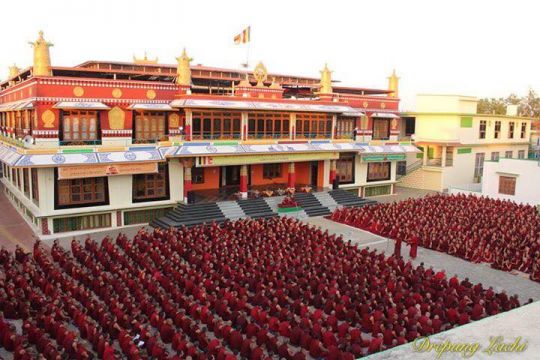
Thousands of monks from the great monasteries, including eighteen Kopan monks, are currently participating in the annual Winter Jang Debate at Drepung Monastery, India.
Monks from various Gelug monasteries are currently participating in an extensive twenty-two day debate on Buddhist logic at Drepung Monastery, India, known as the Winter Jang Debate. There are two sessions daily: prayers for world peace, and debate.
This annual debate dates back to the time of Lama Tsongkhapa and was continued each year until 1959. In 1981 the present and former abbots of the three great monasteries met to revive this debate. However, due to costs the monasteries were only able to sponsor about 200 monks to attend. Seeing the incredible importance of this tradition of bringing together the best scholars to hone their understanding of the Buddha’s highest teachings, Lama Zopa Rinpoche, through the Lama Tsongkhapa Teachers Fund, became the primary sponsor for this debate. Now thousands of monks participate.
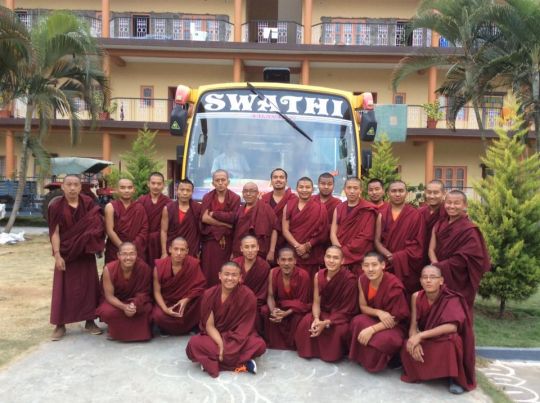
Eighteen monks from Kopan House, Tsawa Khangtsen, are participating in this year’s Winter Jang Debate at Drepung Monastery.
Eighteen monks from Kopan House, Tsawa Khangtsen, are among the thousands of participants attending this year. We offer all of the monks participating our best wishes for a transformative and fruitful event.
Tremendous thanks to the many donors who support the Lama Tsongkhapa Teachers Fund and enable FPMT to sponsor this powerful annual debate. This is something incredible in which to rejoice. You are welcome to participate in this offering at any time.
You can learn more about the beneficial activities of the Lama Tsongkhapa Teachers Fund or the many Charitable Projects of FPMT.
- Tagged: lama tsongkhapa teachers fund, supporting education, supporting ordained sangha fund, winter debate, winter jang debate
- 0
31
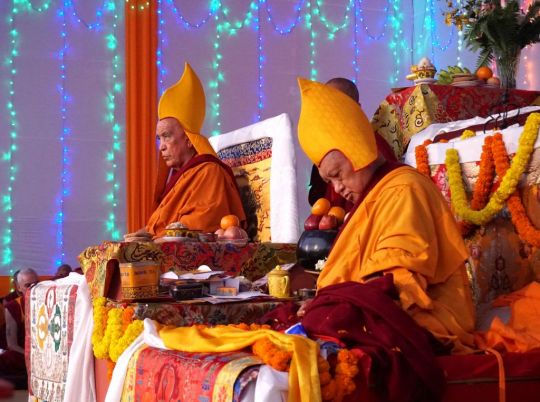
Jangtse Chöje Rinpoche and Lama Zopa Rinpoche during the long life puja offered to Lama Zopa Rinpoche in Bodhgaya on January 2, 2017. Photo by Ven. Lobsang Sherab.
A long life puja was offered to Lama Zopa Rinpoche on behalf of Sera Je Monastery on the Maitreya Project land in Bodhgaya on January 2, 2017. The puja was to thank Rinpoche for twenty-six years of support offered through the Sera Je Food Fund, which provides three vegetarian meals every day to the monks studying at Sera Je Monastery.
During the puja, the head of monastic discipline, who had been at Sera Je Monastery since before the Sera Je Food Fund was established, spontaneously praised Rinpoche for about thirty minutes, noting all the ways Rinpoche had helped the monastery. He explained what it was like at the monastery before food was regularly offered and how the monks have benefited after the fund’s creation. He said Rinpoche has cared for all the thousands of monks for the last twenty-six years like a mother does for her child.
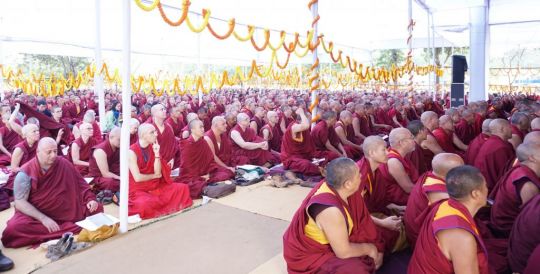
Sangha participating in the long life puja offered to Lama Zopa Rinpoche
Thousands of monks attended the puja as well as Jangtse Chöje; the new abbot of Sera Je Monastery; the past abbot of Sera Je Monastery; the past abbot of Namgyal Monastery, Jhado Rinpoche; and the past abbot of Gyurme Monastery, Khensur Geshe Tashi Tsering.
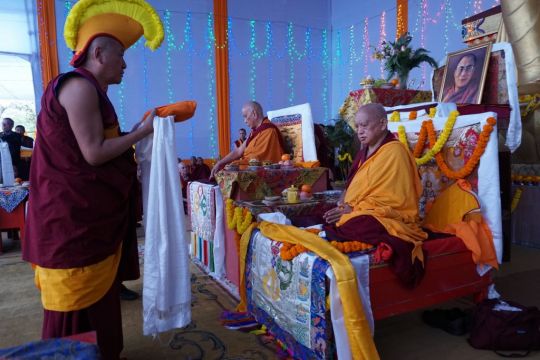
The abbot of Sera Je Monastery making offerings to Lama Zopa Rinpoche
The Sera Je Food Fund has provided millions of meals since 1991. It currently offers approximately 700,000 meals per year, 2,900 meals per day. There are, on average, 1,600 monks benefiting from the food fund.
Please rejoice in the offering of this puja for Lama Zopa Rinpoche’s long life and in Sera Je Food Fund’s twenty-six years of food offerings to the monks of Sera Je Monastery.
You can learn more about the Sera Je Food Fund, read an overview of the food offered daily, or support this project with a donation of any amount.
- Tagged: long life puja, sera je food fund, sera je monastery
- 0
27
Another Year of Offering Food to the Monks of Sera Je Monastery
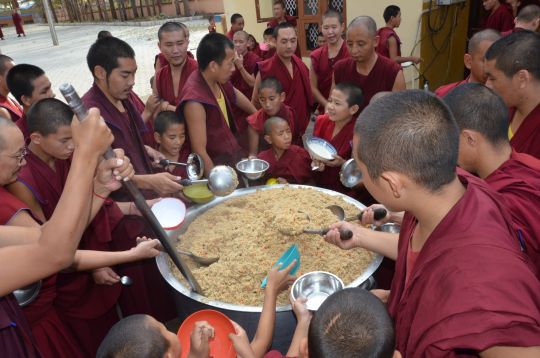
Approximately 1,600 monks benefit from the Sere Je Food Fund every year.
As 2016 comes to a close, we’d like to invite you to rejoice in another year of offering food to all of the monks studying at Sera Je Monastery through the Sera Je Food Fund.
Since 1991 the Sera Je Food Fund has offered millions of meals. We currently offer approximately 700,000 meals per year, 2,900 meals per day.
You can watch a short video about the Sera Je Food Fund as an overview of this incredible project:
www.youtube.com/watch?v=copRgB9eaSo
In the Tibetan tradition, it is customary for monastics to support themselves. In addition to providing for their own housing, individual monks are responsible for purchasing and preparing all of their meals. As many of the monks are refugees from Tibet or from refugee families living in India, they have very little money for quality food and, consequently, were often malnourished and ill. Before the Sera Je Food Fund, most monks at the monastery never had adequate nutrition. Now, for the first time, they are well-nourished, and this makes a dramatic difference in the energy they are able to devote to their studies. Additionally, group preparation of meals and use of a communal kitchen allows more time for the monks to apply themselves to their studies without the added worry of cleaning up and preparing individual meals, monitoring their individual health for adequate protein and nutrition, etc.
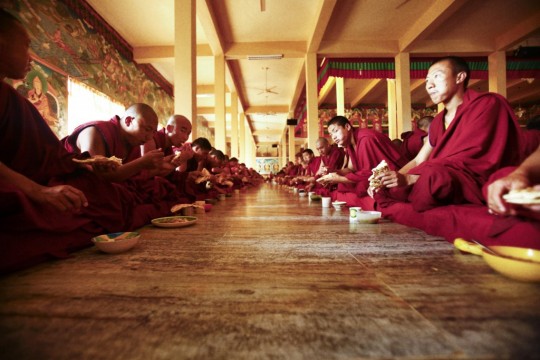
Monks of Sera Je Monastery enjoying a meal provided by the Sera Je Food Fund. Photo by Losan Piatti.
Please rejoice in this incredible service which has been offered since 1991.
On behalf of Lama Zopa Rinpoche, FPMT International Office would like to offer our heartfelt gratitude to all of the kind benefactors who have been contributing to this project over the years and supporting Lama Zopa Rinpoche’s Vast Vision.
You can learn more about the Sera Je Food Fund or support this project with a donation of any amount.
20
The Lama Tsongkhapa Teachers Fund Offers Support to the Teachers of Tomorrow
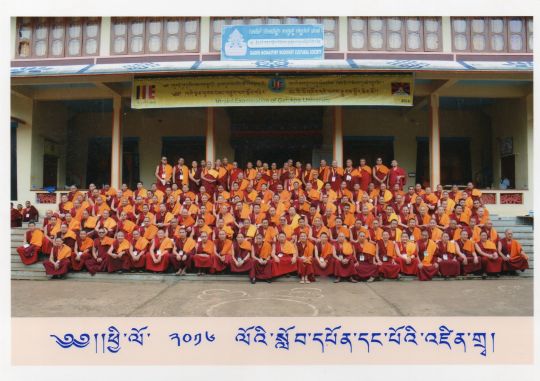
Participants in the 2016 Gelug exam.
On Friday, December 23 Tibetan Buddhists of the Gelug tradition celebrate Lama Tsongkhapa Day, or Ganden Ngamchoe, a celebration of the anniversary of Lama Tsongkhapa’s parinirvana.
Lama Tsongkhapa (1357-1419) was a Tibetan Buddhist master whose studies and meditations in all the major schools of Tibetan Buddhism resulted in the founding of the Gelugpa lineage.
The Lama Tsongkhapa Teachers Fund was established by FPMT in 1997 at the request of His Holiness the Dalai Lama. The purpose of the fund is invest in the preservation of the Gelugpa School of Tibetan Buddhism by supporting the teachers of tomorrow.
The Lama Tsongkhapa Teachers Fund has three main activities:
- Supporting the most senior teachers of the Lama Tsongkhapa tradition
- Supporting the annual Gelug exam
- Supporting the annual winter debate in India and Nepal
The great lamas of the Tsongkhapa tradition preserve the teachings and practices that have been passed from teacher to disciple in an unbroken line beginning with Lama Tsongkhapa himself. This fund is able to offer a small monthly stipend (ranging from $10 – $30 a month) to 150 of the main teachers of the eight great monasteries of the Lama Tsongkhapa tradition.
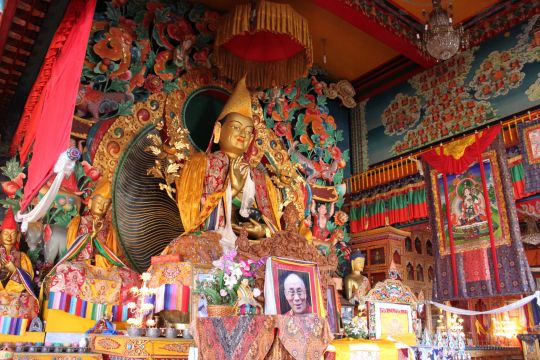
Statue of Lama Tsongkhapa at Kopan Monastery. Photo by Tom Truty.
Each year the foremost scholars from Sera, Ganden, Drepung, Gyume, Gyuto, Tashi Lhunpo and Rato monasteries come together for the annual Gelug exam and the Lama Tsongkhapa Teachers Fund is able to cover basic expenses, such as food and travel, for the 600+ monks who take this exam.
The annual winter debate dates back to the time of Lama Tsongkhapa and was continued each year until 1959. In 1981 the present and former Abbots of the three great monasteries met to revive the annual winter debate, however due to costs the monasteries were only able to sponsor about 200 monks to attend the annual winter debate. Seeing the incredible importance of the winter debate, where the best scholars gather to hone their understanding of the Buddha’s highest teachings, FPMT undertook the responsibility to cover all the costs for the monks of Sera Je Monastery to attend the debate each year.
The annual support offered by the Lama Tsongkhapa Teachers Fund is currently estimated at $USD65,000 and support is welcome from anyone interested in investing in the Gelug teachers of tomorrow.
Since its inception, the Lama Tsongkhapa Teachers Fund, an extension of the Supporting Ordained Sangha Fund, has supported up to 150 senior teachers each year of the main monasteries, plus hundreds of monks attending the traditional winter debate and annual Gelugpa exam.
There are many practices students can do to create merit on December 23, Lama Tsongkhapa Day. FPMT Education Services has put together a resource page to which all are welcome to refer.
- Tagged: lama tsongkhapa, lama tsongkhapa teachers fund, supporting education, supporting ordained sangha fund
- 0
13
New Temple Ceremony at Ngari Khangtsen at Sera Je Monastery
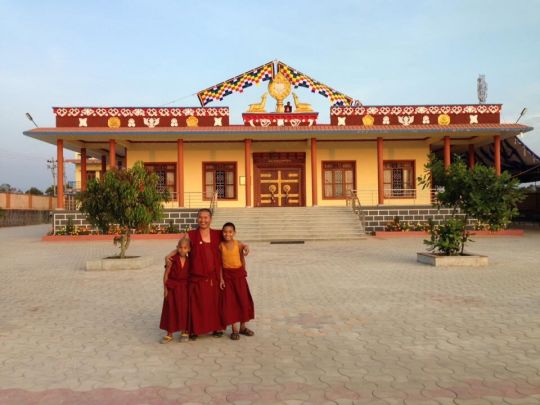
Ngari Khangtsen’s new temple which was recently finished thanks to sponsorship from the Supporting Ordained Sangha Fund.
Ngari Khangtsen recently completed a project that was over two years in the making, a new temple for the monks. The Supporting Ordained Sangha Fund was pleased to offer a grant of support as one of the main sponsors of this project. The opening ceremony was led by Jangtse Choje Rinpoche on Lhabab Duchen. Ven. Roger Kunsang, assistant to Lama Zopa Rinpoche and the CEO of FPMT, Inc., received a lovely letter of thanks from the khangtsen which included the following: “[This celebration] happened with Lama Zopa Rinpoche and FPMT support and we thank you so much to each and everyone who contributed. We also thank you for your leadership running the main office of FPMT and caring for those who really need support. Geshe Ngawang Sangye la also express his heartfelt thanks to Rinpoche and yourself. We dedicate all the merit to the life of Lama Zopa Rinpoche and to successful FPMT activity all around the world.”
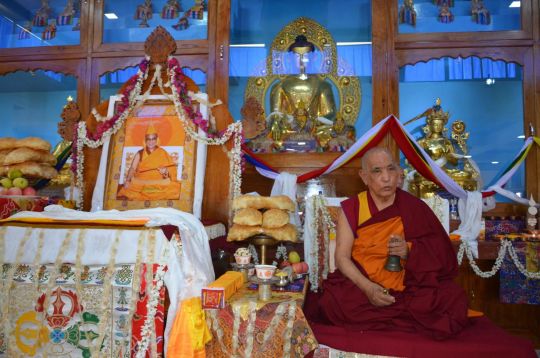
Jangtse Choje Rinpoche leading the opening ceremony at the new Ngari Khangtsen temple.
Each khangtsen (hostel in Tibetan) is linked to a region in Tibet and has to accommodate the monks that originate from a particular area. The khangtsen functions independently from the main monastery with each house having the responsibility to provide the living necessities for their own monks including housing, medical care, and educational needs. Each khangtsen has its own prayer hall where all the monks gather to do prayers, pujas, and practices. Ngari Khangtsen was originally founded in Western Tibet. In 1970 it was reestablished at Sera Je Monastery in South India. Currently Sera Je’s Ngari Khangtsen has over 140 monks who are mostly ethnic Tibetans from the Himalayan regions of India, Tibet, Nepal, and Bhutan.
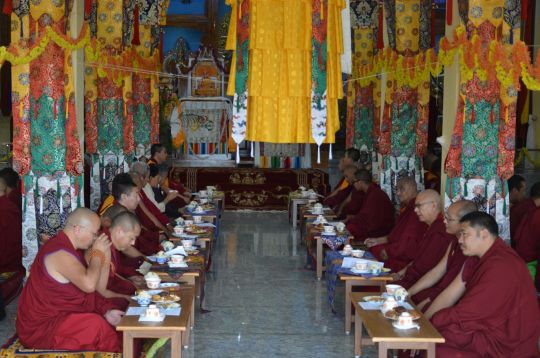
Opening ceremony at the new Ngari Khangtsen temple on Lhabab Duchen. The new temple will be able to accommodate all the monks of this khangtsen.
The monks explained, “We had outgrown the old 1983 prayer/ assembly hall made to house a maximum of 50 persons. In the new quarters, there is room for a brand new spacious prayer hall. Today, we have over 150 monks ranging from the very young to the very old. And we have definitely outgrown the old prayer hall. On hot summer days, the hall just does not accommodate enough oxygen for the number of praying and reciting participants!”
Ngari Khangtsen is very dear to FPMT. Khensur Jampa Tegchok, former abbot of Sera Je Monastery and Nalanda Monastery and resident geshe of many FPMT centers over the years, lived in Ngari Khangtsen while receiving his education at Sera Je Monastery. FPMT also supports school children of Ngari Institute of Buddhist Dialectics by offering daily meals. This school was started by the monks of Ngari Khangtsen.
Please rejoice that this temple project was brought to fruition and will benefit all of the monks of Ngari Khangtsen now and in the future.
You can learn more about the Supporting Ordained Sangha Fund and the ways it supports monks and nuns.
- Tagged: monasteries and nunneries, ngari khangtsen, sera je monastery, supporting ordained sangha fund
- 0
29
Monlam Celebration for All Buddhist Traditions in Bhutan
The Preserving the Lineage Fund was pleased to offer US$4,000 toward a March 2017 Monlam festival in Bhutan for 300 individuals representing all Buddhist traditions.

Lama Tsongkhapa (1357–1419) is the founder of the Gelugpa school of Tibetan Buddhism.
Prayers, teachings, discussions, and meals will be shared among the participants in celebration of Monlam which marks a period when Lord Buddha performed many miracles, beginning with Losar (the Tibetan New Year) on the first day and culminating on the fifteenth day, Chotrul Duchen (the Day of Miracles). Monlam Chenmo, or the Great Prayer Festival, was established by Lama Tsongkhapa, the founder of the Gelug tradition of Tibetan Buddhism, in 1409. The first two weeks of the new year, Monlam, commemorate the time when the Buddha displayed his power by performing a number of miracles. Lama Tsongkhapa chose the Monlam Chenmo to coincide with the anniversary of incredible events in Shakyamuni Buddha’s life traditionally celebrated during the first two weeks of the lunar new year.
This Monlam celebration in Bhutan is particularly meaningful as it is bringing together all of the Buddhist traditions in a harmonious gathering.
Please rejoice in this celebration of Lord Buddha’s many accomplishments and this coming together of Buddhist traditions.
Since its inception, the Lama Tsongkhapa Teachers Fund, an extension of the Supporting Ordained Sangha Fund, has supported up to 150 senior teachers each year of the main monasteries, plus hundreds of monks attending the traditional winter debate and annual Gelugpa exam.
- Tagged: lama tsongkhapa, monlam
- 0
25
714 Monks Participate in Annual Gelug Exam at Gaden Lachi Monastery
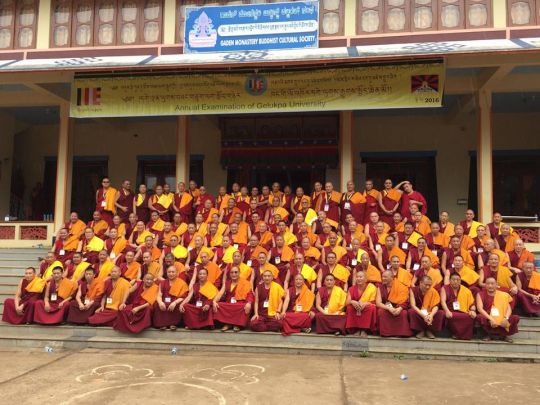
Participants in the 2016 Gelug exam at Gaden Lachi Monastery, India.
Each year the foremost scholars from the main Gelug monasteries come together for the annual Gelug examination and the Lama Tsongkhapa Teachers Fund offers a grant to cover the basic expenses including food for participants.
This September 714 monks participated in this annual exam at Gaden Lachi Monastery, India.
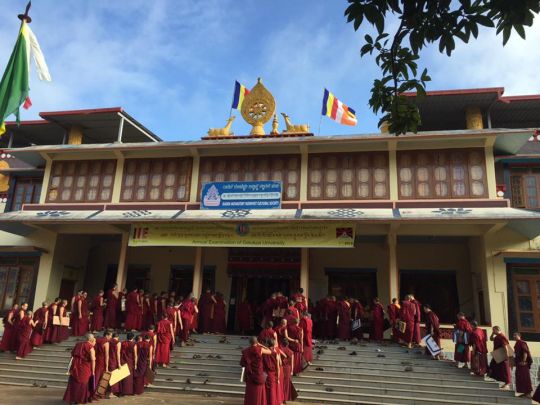
714 monks participated in this year’s Gelug exam.
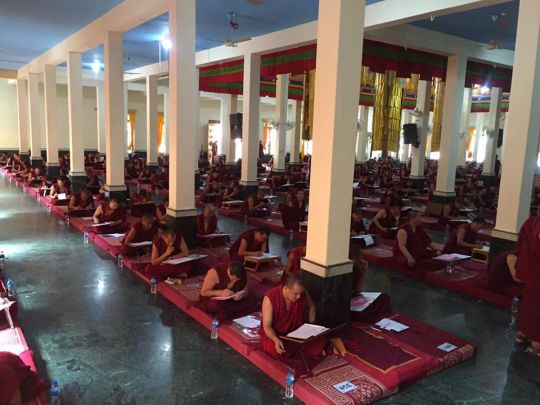
In addition to debate, the monks are required to pass a written examination.

Food preparation for the participants.
The Lama Tsongkhapa Teachers Fund would like to congratulate all the monks for their commitment and dedication to their studies. Due to this grant each year, all qualified monks are able to participate in the debate and examination, rather than being exempt due to prohibitive costs.
These scholars are the future of the Lama Tsongkhapa tradition and it is a high priority for FPMT to support them at this level of their education.
Tremendous thanks to all the donors who make these offerings possible. You are welcome to offer any amount to the Lama Tsongkhapa Teachers Fund to contribute to the support being offered to the current and future teachers of the Mahayana tradition.
Since its inception, the Lama Tsongkhapa Teachers Fund, an extension of the Supporting Ordained Sangha Fund, has supported up to 150 senior teachers each year of the main monasteries, plus hundreds of monks attending the traditional winter debate and annual Gelugpa exam.
- Tagged: gelug exam, lama tsongkhapa teachers fund, supporting education, supporting ordained sangha fund
- 0
4
Advice from Lama Zopa Rinpoche: The Benefits of Offering to Sangha
By Lama Zopa Rinpoche
Why Offering to the Sangha Is So Powerful
In the past, there was one man who had nothing, but he offered medicinal food just one time to four fully ordained monks. (These were not monks who were aryas and had wisdom directly perceiving emptiness; these were just ordinary Sangha.) Due to the karma of that offering, after he died, he was born as a most powerful wealthy king in India called King Ashoka. That was the result from offering just one time.
Karma expands, and so from one action of charity, the result that one will experience goes on for many lifetimes, many eons. The karma from making charity one time is not just resultant happiness that is received one time and then is finished. This is maybe what many people think, but that’s not correct. One experiences the resultant happiness for eons. It is amazing. Then, depending on your motivation – especially if it is done with a bodhichitta motivation – this one action of making charity can create the cause for you to go to enlightenment.
According to the Tengyur, Buddha said:
For any sentient being, who during the period of my teachings
Makes charity well (even if the material is the size of hair),
For 80,000 eons will experience the great result of great enjoyment;
No pain, no disease, and enjoyment of happiness.
Like that, one will be enriched with all the desirable things.
At the end you can actually achieve the result – the peerless cessation and completion (enlightenment).
After hearing of this great result, who wouldn’t want to collect merit?

The monks of Sera Je Monastery are offered three nutritious meals every single day through the Sera Je Food Fund, one of FPMT’s Supporting Ordained Sangha funds.
The Power of Offering to So Many Sangha
In the very beginning, Sera Je Monastery had approximately 4,000 monks, then 3,000 monks, now maybe there are about 2,500 monks. Making offerings to them is amazing. There are so many monks – wow, wow, wow, wow, wow – and therefore so many causes of enlightenment one can collect!
The Power of Offering to the Buddha, Dharma, and Sangha
This is also an offering to the Buddha, Dharma, and Sangha. By offering to the Buddha – wow, wow, wow, wow, wow.
In Buddha’s teachings, it is mentioned in the Mantra of Undying Drum Sound:
If you devote yourself to the Unimaginable Ones (Buddha, Dharma, and Sangha,
who have unimaginable qualities),
The ripening aspect of the result of that devotion has unimaginable benefits.
Also, it is mentioned in the Compassionate Buddha Sutras:
The Tathagata Buddha has immeasurable qualities.
Offering to the tathagatas also has immeasurable benefits that are endless,
Inconceivable, incomparable, unfathomable, and numberless.
Offering to the Buddha, Dharma, and Sangha is an unbelievable act. It is important to remember this when you make an offering to the Sangha. Think that you are also offering to the Buddha and Dharma simultaneously.
The Power of Offering to the Guru
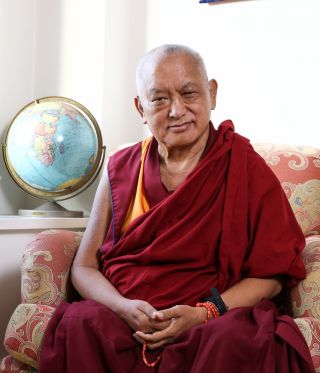
Lama Zopa Rinpoche. Photo by Edward Sczudlo.
This is also an offering to the guru. From this you collect the highest amount of merit – the most merit – more than offering to numberless Buddha, Dharma, and Sangha as well as numberless statues, stupas, and scriptures in the ten directions. No matter how many extensive offerings you make – even filling the whole sky – all that merit becomes small when compared to the merit of offering to the guru.
Additionally, this is the most powerful purification. It purifies defilements and negative karma collected from beginningless rebirths. It is the most powerful purification. This is the quickest way to achieve realizations, the quickest way to be free from the oceans of samsaric sufferings, and the quickest way to achieve buddhahood, the total cessation of all the obscurations and completion of all the realizations.
Even giving one rupee or one cent to the Sangha has all these benefits.
Then, of course, it has the benefit of also preserving the Dharma and helping to spread the Dharma.
How This Offering Benefits All Sentient Beings
The ultimate point is that this offering also benefits all the six-realm sentient beings. Any practice that the Sangha do in the monastery, they do for all the six-realm sentient beings, to benefit them. Every sadhana or practice starts with the motivation for “mother sentient beings,” which means all the six-realm sentient beings.
Every dollar offered – even just one dollar, even the smallest amount of money offered – has all these benefits. And the benefits go to all sentient beings: every mosquito, every fish, every pitiful chicken that is taken by a truck to be killed, every sentient being in numberless universes receives these benefits.
Through the Supporting Ordained Sangha Fund FPMT offers essential needs directly to individual Sangha as well as to monasteries and nunneries.
20
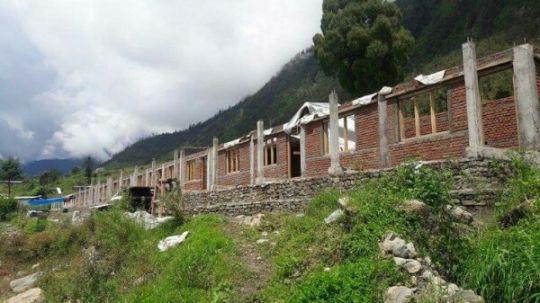
The nuns rooms at Tashi Chime Gatsal Nunnery had to be completely rebuilt following earthquake destruction.
Tashi Chime Gatsal Nunnery (also known as Bigu Nunnery), located in a remote area of Nepal, is still rebuilding following devastation from the April 2015 earthquake. All of the buildings at the nunnery were destroyed and there was no safe housing for the seventy-five nuns. Additionally, there was no accessible health care facility or place for the nuns to study as all roads were blocked due earthquake destruction. The Nepal Earthquake Support Fund offered immediate aid to the nunnery following this destruction, to help with food and health care needs while the nuns occupied their temporary shelter in Khatmandu.
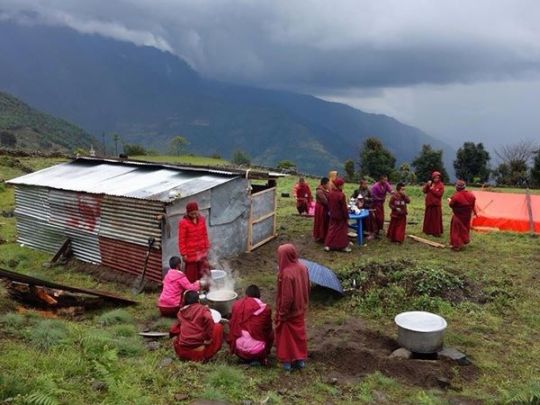
Some of the nuns of Tashi Chime Gatsal who were displaced following earthquake destruction.
These nuns have been offering two 100 million mani retreats every year. Lama Zopa Rinpoche has been supporting this through the Practice and Retreat Fund for over seven years and a very kind benefactor has sponsored one of their retreats this year as well.
The sponsorship of 100 million mani retreats is one of Lama Zopa Rinpoche’s Vast Visions for the FPMT organization. The nuns completed the first 100 million mani recitations while in temporary housing in Khatmandu, but they have now returned to the nunnery and will complete the second part of the retreat there. Sixty-five nuns are engaged in the mani retreat approximately six hours per day. They dedicate their practice to the long life of His Holiness the Dalai Lama and Lama Zopa Rinpoche, for all of Rinpoche’s Dharma wishes to be successful, and for the entire FPMT organization and projects to bring the most benefit to all sentient being.
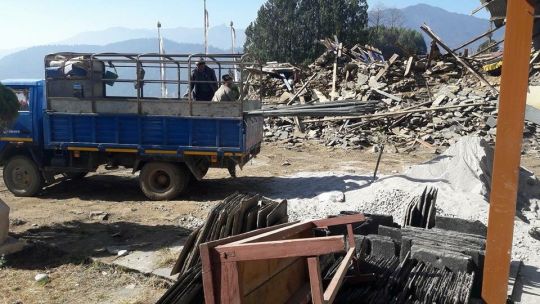
The damage to Tashi Chime Gatsal Nunnery was severe and the entire nunnery needs to be rebuilt.
By sponsoring the retreat, FPMT directly supports the nuns through funding the cost of their daily meals. The nunnery is further supported by this grant because any funds not used directly for the cost of the retreat can be used for the overall development of the nunnery. Additionally, the Nepal Earthquake Support Fund has offered another grant for the rebuilding of a new kitchen for the nuns. This is an immediate need as the nuns need a proper kitchen facility to support the nuns who are in retreat as well as those who are not.
The nunnery has a long way to go before it is rebuilt in proper condition. In addition to the kitchen, they are now building the nuns rooms and a puja hall for group practice. This work will be essential for reestablishing a safe and conducive environment in which the nuns can live, study, and practice Dharma.
The Practice and Retreat Fund provides grants and sponsorships for students engaged in retreats such as 108 nyung nä retreats, 100 million mani retreats, recitations of sutras and long term retreat.
- Tagged: bigu nuns, mani retreat, monasteries and nunneries, supporting ordained sangha, tashi chime gatsal nunnery
- 0
30
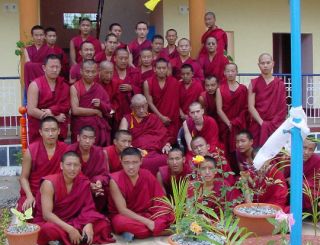
Teenage Tenzin Ösel Hita with the monks at Sera Je Monastery.
We’d like to invite you to rejoice in twenty-five years of the Sera Je Food Fund offerings meals to the monks of Sera Je Monstery!
The Sera Je Food Fund began in 1991 when Tenzin Ösel Hita, the recognized incarnation of Lama Yeshe, entered Sera Je Monastery in southern India at age six. It is customary for a monk’s sponsor to make offerings to all Sangha on the day of officially entering the monastery and Lama Zopa Rinpoche wanted the offering to be of the greatest practical benefit to the monastery itself. After discussion with the abbot of Sera Je Monastery, it was determined that the most beneficial offering would be to create a food fund whereby all of the monks at Sera Je Monastery could be offered quality meals for free. In this way, Lama Zopa Rinpoche was not simply offering lunch on the day of Ösel’s entrance to the monastery but, without precedent, taking on the responsibility of providing meals to every monk at Sera Je for the rest of their lives.
Initially, the fund offered money to each monk for lunch. At that time there were 1,300 monks and the annual cost was about US$25,000.
It became apparent that it would be much easier for the monks to have the meals cooked and offered, so in 1997, Lama Zopa Rinpoche offered US$25,000 for a new kitchen and began paying the salary of seven fulltime cooks. At that time there were 1,900 monks and the annual cost was about US$175,000.
In 1997, six years after starting the fund, Lama Zopa Rinpoche visited Sera Je Monastery. At that time, many of the older geshes, some with tears in their eyes, thanked Rinpoche and spoke of how the fund was benefiting the monastery. Monks could now attend all the morning debate sessions instead of taking time out to prepare meals. Additionally, the fund alleviated the great burden teachers carried while providing for students who had no resources.
In 1998, Lama Zopa Rinpoche and the Sera Je Food Fund took on the responsibility of offering dinner to each monk.

Sera Je monks help prepare meals for in the Sera Je Food Fund kitchen.
In 2003, in addition to offering lunch and dinner, breakfast began to be sponsored by the Sera Je Food Fund three months a year.
In 2008, Lama Zopa Rinpoche and the Sera Je Food Fund took on the responsibility to offer three meals a day to all monks of Sera Je. Osel Labrang took over management on the ground, ensuring the quality of the food and managing all aspects of buying and preparing the food.
In 2012, In addition to offering all the meals to all the monks at Sera Je Monastery the Sera Je Food Fund also took on the responsibility to offer breakfast to the young monks who attend the Sera Je school. This has been the practice of the fund since 2012.
Since 1991 the Sera Je Food Fund has offered millions of meals. We currently offer approximately 700,000 meals per year, 2,900 meals per day.
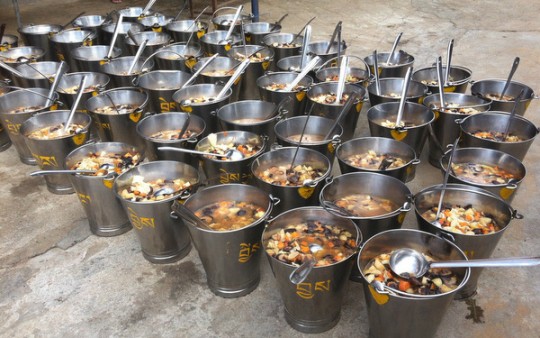
Healthy and hearty vegetarian soup is often offered, through the Sera Je Food Fund, as dinner to the monks of Sera Je Monastery.
There are, on average, 1,600 monks benefiting from the food fund and the annual cost is US$200,000.
In the Tibetan tradition, it is customary for monastics to support themselves. In addition to providing for their own housing, individual monks are responsible for purchasing and preparing all of their meals. As many of the monks are refugees from Tibet or from refugee families living in India, they have very little money for quality food and, consequently, were often malnourished and ill. Before the Sera Je Food Fund, most monks at the monastery never had a full stomach. Now, for the first time, they are well-nourished, and this makes a dramatic difference in the energy they are able to devote to their studies. Additionally, group preparation of meals and use of a communal kitchen allows more time for the monks to apply themselves to their studies without the added worry of cleaning up and preparing individual meals, monitoring their individual health for adequate protein and nutrition, etc.
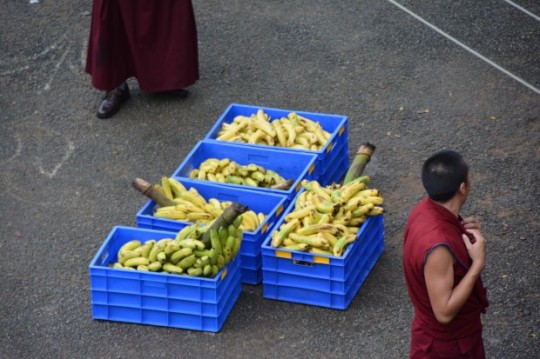
Over 22,000 bananas are offered in a typical month to the monks of Sera Je Food Fund.
In one month, nearly 22,000 bananas, 120 bottles of soy sauce, and an incredible 5,500 pounds of flour, among many other ingredients including vegetables, rice, noodles, and tea, are utilized in preparation for this offering of daily vegetarian meals.
Please rejoice in this incredible service which has been offered without interruption for twenty-five years and will continue far into the future. All are welcome to participate in this offering by donating to the fund.
On behalf of Lama Zopa Rinpoche, FPMT International Office would like to offer our heartfelt gratitude to all of the kind benefactors who have been contributing to this project over the years and supporting Lama Zopa Rinpoche’s Vast Vision.
You can learn more about the Sera Je Food Fund or support this project with a donation of any amount.
- Home
- News/Media
- Study & Practice
- About FPMT Education Services
- Latest News
- Programs
- New to Buddhism?
- Buddhist Mind Science: Activating Your Potential
- Heart Advice for Death and Dying
- Discovering Buddhism
- Living in the Path
- Exploring Buddhism
- FPMT Basic Program
- FPMT Masters Program
- FPMT In-Depth Meditation Training
- Maitripa College
- Lotsawa Rinchen Zangpo Translator Program
- Universal Education for Compassion & Wisdom
- Online Learning Center
- Prayers & Practice Materials
- Overview of Prayers & Practices
- Full Catalogue of Prayers & Practice Materials
- Explore Popular Topics
- Benefiting Animals
- Chenrezig Resources
- Death & Dying Resources
- Lama Chopa (Guru Puja)
- Lama Zopa Rinpoche: Compendium of Precious Instructions
- Lama Zopa Rinpoche: Life Practice Advice
- Lama Zopa Rinpoche Practice Series
- Lamrim Resources
- Mantras
- Prayer Book Updates
- Purification Practices
- Sutras
- Thought Transformation (Lojong)
- Audio Materials
- Dharma Dates – Tibetan Calendar
- Translation Services
- Publishing Services
- Teachings and Advice
- Find Teachings and Advice
- Lama Zopa Rinpoche Advice Page
- Lama Zopa Rinpoche: Compendium of Precious Instructions
- Lama Zopa Rinpoche Video Teachings
- ༧སྐྱབས་རྗེ་བཟོད་པ་རིན་པོ་ཆེ་མཆོག་ནས་སྩལ་བའི་བཀའ་སློབ་བརྙན་འཕྲིན།
- Podcasts
- Lama Yeshe Wisdom Archive
- Buddhism FAQ
- Dharma for Young People
- Resources on Holy Objects
- Ways to Offer Support
- Centers
- Affiliates Area
- Teachers
- Projects
- Charitable Projects
- Make a Donation
- Applying for Grants
- News about Projects
- Other Projects within FPMT
- Support International Office
- Projects Photo Galleries
- Give Where Most Needed
- FPMT
- Shop
Translate*
*powered by Google TranslateTranslation of pages on fpmt.org is performed by Google Translate, a third party service which FPMT has no control over. The service provides automated computer translations that are only an approximation of the websites' original content. The translations should not be considered exact and only used as a rough guide.Renunciation of samsara is not only the business of monks and nuns. Whoever is seeking liberation or enlightenment needs renunciation of samsara.









